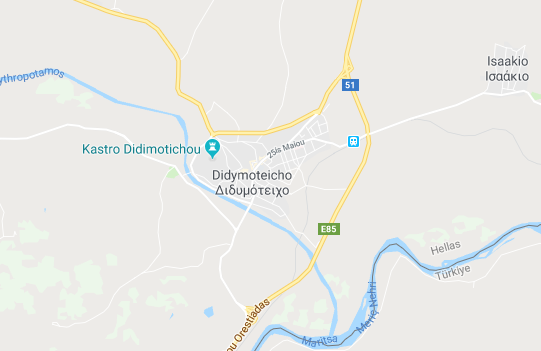The respondent who is aged 47 started his journey on 15th of May 2019 from Edirne (Turkey). He was with two other people aged between 20 to 25, making a group of three. The group managed to cross the river which borders Turkey and Greece with a boat. They continued their journey and passed through a village which the respondent named Didymoteicho.

The group walked for three days until they were apprehended by Greek police at 3:30 am on 18th of May 2019 in a forest which is separated by a road (approximate coordinates: 41.243598, 26.313322), not far away from the Greek town Mandra.
According to the respondent, he saw two police cars with seven policemen approaching them and they finally managed to arrest the group.
The group tried to explain their situation to the policemen, saying that they don’t want asylum in Greece and just want to continue their journey towards Germany. However, the officers didn’t pay heed to what the group was saying. The respondent tried to show them all the documents proving that his family had been granted asylum in Germany, but the officers didn’t reply to any of their comments. The officers took the group’s cell phones and never gave them back to their owners. Soon they called a van with two civilian people on board. The van, according to respondent, was not a police vehicle but a white civilian Volkswagen van. He described the van to have been very small, making it difficult for them to even breathe. They couldn’t see the front compartment of the vehicle as there was a barrier between the front seats and the rear compartment where the group was placed.
After some 45 minutes of driving, around 4:15 am, the van reached a building which the respondent called “prison”. They were put in a cell behind bars. The group found out that there were already around 25 people present in the building who also had tried to cross the border.
During their detention, the respondent wasn’t provided food, and neither did he have access to a toilet. Moreover, access to translator was also not provided. The next night, around 7pm, all the detained persons, including families with children, were told to board a big van and were shifted to an unknown place.
This time, according to the respondent, the people who put them into the big van and accompanied them all the way were not the local police but “commandos” who were eight in number with desert colored uniforms wearing masks with only their eyes visible. All the people were told to remain head down while being put into the van so that they could not have a closer look at the “commandos”.
After an hour journey, all the people were now taken out of the van at a place which was near a river. As it turned out, the river was the border river between Greece and Turkey. There were already some more arrested people lying on the ground with their heads down. According to the respondent, now the total number of people was around 40 – 45. This larger group consisted of people from Syria, Egypt, Algeria and Tunisia.
At this stage of the interview, the respondent termed the behavior of the commandos towards the people on the move as “inhuman”. The officers in the desert-colored uniforms punched, kicked and hit all the people with batons. According to the respondent, one Egyptian refugee was hit with batons on his head which resulted in a serious head injury as he immediately fell down on the ground and started bleeding.
“Commandos should have taken care of humanity; they punched me and took my 400 Euros”.
After gathering all the people together, the officers made them cross the river with a boat. There were two boats which were repeatedly used to shift the people to the other side of the river, each time with one boat carrying ten people accompanied by two armed officers. This way, all the people were shifted to the other side of the river which was in Turkey at around 9:30 pm on 19th of May.
There were no Turkish authorities on the other side of the river. The respondent then went to Istanbul to borrow some money from one of his relatives there as all of his money along with personal belongings had been taken by the Greek authorities.
